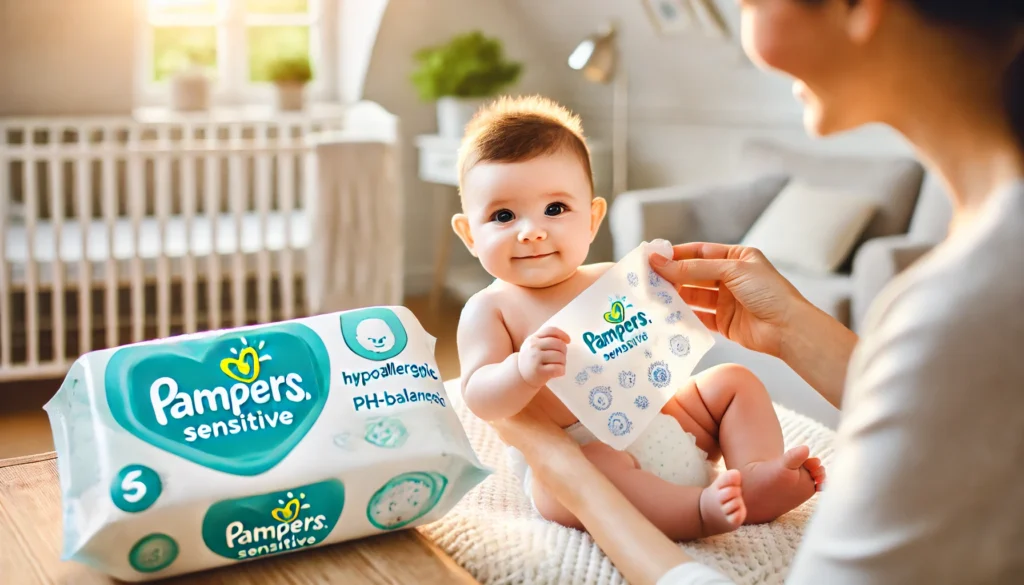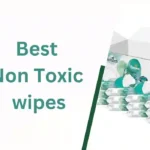As an Amazon Associate. I earn from qualifying purchases
New parents are often faced with a barrage of decisions when it comes to the well-being of their infants. One area that receives significant attention is the selection of baby products, particularly concerning the sensitivity of baby skin. Among these essentials, baby wipes are a staple in any parent’s arsenal, promising convenience and hygiene.
However, a growing concern among consumers revolves around the potential toxicity of these often-used items. Are Pampers Sensitive Wipes, marketed to protect the sensitive skin of your little one, truly safe? In this comprehensive review, we’ll investigate the safety of Pampers Sensitive Wipes, break down their chemical composition, and suggest alternative options for safety-conscious parents.

What Are Pampers Sensitive Wipes?
Before we dig into the heart of the matter, it’s essential to understand what makes Pampers Sensitive Wipes a trusted choice for millions of parents. These wipes are specially designed for delicate baby skin.
The advertisement claims they offer gentle cleaning and states they are hypoallergenic and pH-balanced, free from parabens, phenoxyethanol, and alcohol. They further specify that no perfume or harsh irritants are in their formula. Pampers Sensitive Wipes aim to keep babies clean without any compromise on their skin’s health.
Are Pampers Sensitive Wipes Toxic?
The simple answer is no, Pampers Sensitive Wipes are not toxic. They have undergone rigorous safety testing and meet the highest standards set by governing bodies such as Health Canada and the U.S. Consumer Product Safety Commission.
However, like many consumer products, Pampers Sensitive Wipes contain chemicals that might raise concerns for some parents. Let’s take a closer look at the ingredients.
Breaking Down Ingredients in Pampers Sensitive Wipes
The real answer to the safety of Pampers Sensitive Wipes lies in their ingredients. While they proudly claim the omission of certain known irritants, what do they contain? The ingredients in Pampers Sensitive Wipes are Water, Citric acid, PEG-40 hydrogenated castor oil, Sodium citrate, sorbitan caprylate, Sodium benzoate, and disodium EDTA. Some of these ingredients are binders, solvents, and preservatives that help maintain the consistency and shelf-life of the product.
However, within this list, there could still be elements that prompt health concerns.
Analyzing the Safety of Pampers Sensitive Wipes
The levels at which these ingredients could pose a risk are often the subject of scientific debate. For instance, EDTA and sodium benzoate in high concentrations have been cited in health debates, but their presence in Pampers Sensitive Wipes, and other various similar products, has been deemed safe by health regulatory authorities when used according to guidelines.
Parents should approach a product like Pampers Sensitive Wipes with a balanced approach, acknowledging that despite fewer ‘red-flag’ chemicals, there is still a level of chemical exposure inherent in the use.
Safe Alternatives for Sensitive Skin
For parents who wish to completely avoid certain synthetic ingredients, the market does offer alternatives. Many natural and organic baby wipes contain ingredients like aloe, chamomile, or calendula and are free from parabens, phthalates, and alcohol. While they may come at a higher price point, they offer peace of mind to parents concerned about their baby’s exposure to potentially harmful chemicals.
Tips for Choosing Safe Baby Wipes
When navigating the sea of products, a few key considerations can guide parents towards a safer choice.
First, it’s essential to read labels—and understand what those ingredients are. Look for recognizable, naturally derived ingredients and avoid products that list ‘fragrance’ without specificity, as this often serves as a blanket term for many potential irritants.
Second, consider packaging sustainability; certain wipes are flushable, which raises the question of biodegradability vs. the convenience it offers.
Third, always be mindful of how your baby’s skin reacts. Even products marketed as ‘sensitive’ may not work for your child, so a patch test is crucial.
In Conclusion
While Pampers Sensitive Wipes may not be entirely free from certain chemicals, they are considered safe for use by regulatory bodies. However, for parents looking to minimize their baby’s exposure to synthetic ingredients, there are natural and organic alternatives available in the market.
FAQs
Are Pampers Sensitive Wipes safe for newborns?
Yes, Pampers Sensitive Wipes are designed and marketed to be safe for use on newborns’ delicate skin.
Can Pampers Sensitive Wipes cause allergies?
It is unlikely, but not impossible, that some babies may have allergies or sensitivities to certain ingredients in Pampers Sensitive Wipes. Patch testing should always be done before normal use.
Can Pampers Sensitive Wipes be flushed down the toilet?
No, it is not recommended to flush baby wipes (including Pampers Sensitive Wipes) down the toilet as they can clog pipes and harm the environment. It is best to dispose of them in a trash bin.
Do Pampers Sensitive Wipes contain alcohol?
No, Pampers Sensitive Wipes do not contain alcohol. They are also free from parabens, phenoxyethanol, and other known irritants.










